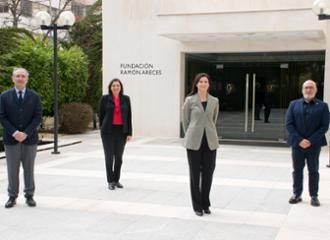Proyectos de investigación
Comienza el contenido principal
The epigenetic regulation of reelin in Alzheimer's disease
Genoma y epigenoma
Centro de investigación o Institución: Instituto de Neurociencias. CSIC-Universidad Miguel Hernández. Alicante.
Abstract
The group was the first to demonstrate the anomalous expression of the glycoprotein Reeline in Alzheimer's disease (AD), which may indicate its possible participation in the aetiology of the disease. The levels of Reeline increase in the presence of the β amyloide peptide (or Aβ) effector of Alzheimer's; when the expression of Reeline is altered in the AD brain, with increased levels of transcription. This project has the aim of examining the possible epigenetic regulation of Reeline in AD, mainly through the state of methylation of its promoter, and the influence that Aβ may have on the same. However, the β‑amyloide may also modulate genetic expression through other routes. The known β‑amyloide precursor (APP), when it is processed by enzymes known as secretases to generate Aβ, may also produce intracellular fragments. ICD (the intracellular domain of terminal carboxyl) of the APP has been proposed as a transcription regulator. Curiously, the Reeline receptors, mainly ApoER2 in the brain, are also processed by secretases following their binding with the ligand, Reeline. Work has recently taken place to characterise the processing of ApoER2 after its binding to Reeline, and particularly the generation of its ICD. The generation of an ICD of ApoER2 has been described after binding to its ligand, as able to modulate the genetic expression of Reeline itself. This result is somewhat unexpected, given that canonically Reeline is understood to have a "paracrine" effect, being secreted by certain cells and exercising an effect on other target cells (which express the ligand); however, many cells that express ApoER2 also express Reeline. The results also show that the protein preseniline‑1 (PS1), a catalytic subunit of the γ‑secretase complex and the final effector of the processing of APP and ApoER2, is the key in this regulation.
-
 Actividades relacionadas
Actividades relacionadas
-
 Proyectos relacionados
Proyectos relacionados
-
 Noticias relacionadas
Noticias relacionadas
-
 Publicaciones relacionadas
Publicaciones relacionadas
 Actividades relacionadas
Actividades relacionadas
-
3
jun
2021
Conversaciones online desde la Fundación Ramón Areces El futuro sin límite de las aplicaciones del ARN. Vacunas y tratamiento de enfermedades ONLINE desde: www.fundacionareces.tv/directo, Jueves, 3 de junio de 2021, 19:00 horas
-
26
sep
2022
Conferencia Terapia génica y celular avanzada… Más allá de la última frontera Madrid, Lunes, 26 de septiembre de 2022, 19:00 horas
-
9
may
2024
Conferencia Genes de mosca y genes humanos: una comparación Madrid, Jueves 09 de mayo de 2024, 19:00 horas
 Proyectos relacionados
Proyectos relacionados
- Regulación epigenética de Reelina en la enfermedad de Alzheimer 2011 Investigador Principal: Javier Sáez Valero Centro de investigación o Institución: Instituto de Neurociencias. CSIC-Universidad Miguel Hernández. Alicante.
- Nanopartículas sintéticas como tratamiento innovador en la sepsis (SPRINT-4-SEPSIS) 2018 Investigador Principal: Antonio Artigas Raventós Centro de investigación o Institución: Instituto de Investigación e Innovación Parc Taulí (I3PT), Corporación Sanitaria i Universitaria Parc Taulí
- Biomarcadores metagenómicos de riesgo y tratamiento de la Sepsis Bacteriana en el marco de la Medicina de Precisión 2018 Investigador Principal: María Teresa Coque González
 Noticias relacionadas
Noticias relacionadas
-

Eric D. Green: “La genómica debe integrarse en la medicina convencional”
Publicado el 12/03/2021
 Publicaciones relacionadas
Publicaciones relacionadas
Fin del contenido principal






